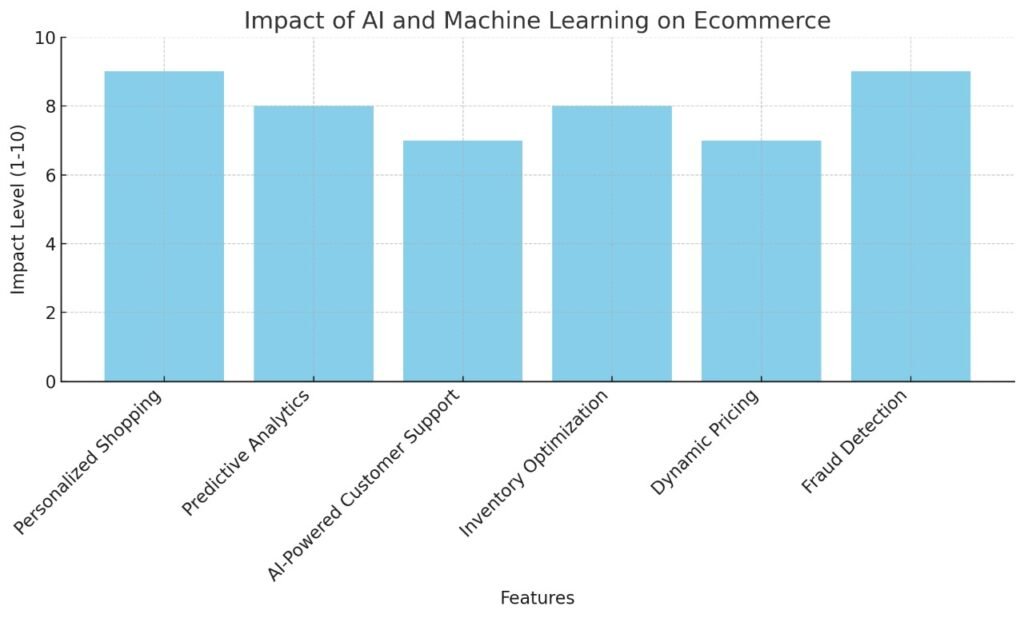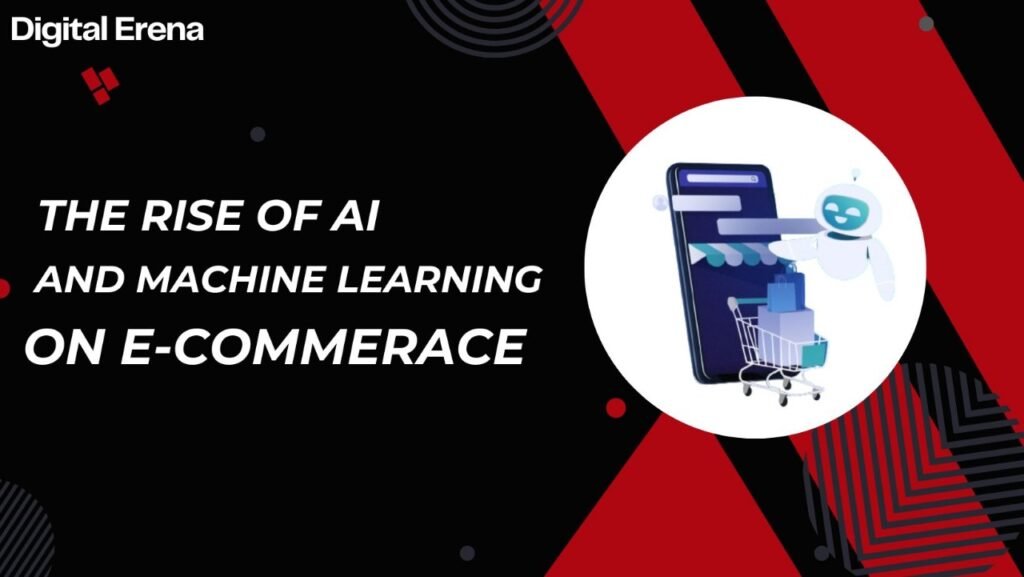The integration of AI and machine learning in ecommerce has revolutionized the way we shop online. As technology continues to evolve, these advancements are shaping the future of online retail, offering unprecedented opportunities for businesses and consumers alike. In this blog post, we will explore the impact of AI and machine learning on ecommerce, focusing on key areas such as personalization, predictive analytics, and more.
Introduction
The rise of AI and machine learning in ecommerce is transforming the landscape of online retail. By leveraging advanced algorithms and data analysis, businesses can offer personalized experiences, optimize operations, and make data-driven decisions. In this comprehensive guide, we’ll delve into how these technologies are shaping the future of ecommerce and why they are essential for staying competitive in today’s digital age.
The Role of AI in Ecommerce
The simulation of human intelligence processes by machines, especially computer systems, is known as artificial intelligence (AI). In ecommerce, AI is used to improve various aspects, including customer service, product recommendations, and inventory management.
Personalization
Personalization is one of the main advantages of AI in e-commerce. AI algorithms analyze customer data, such as browsing history, purchase patterns, and preferences, to provide tailored product recommendations. This personalized shopping experience enhances customer satisfaction and boosts sales.

Benefits of Personalization
- Increased Conversion Rates: Personalized recommendations lead to higher conversion rates as customers are more likely to purchase products that align with their preferences.
- Customer Retention: Personalized experiences foster customer loyalty and encourage repeat purchases.
- Enhanced Customer Experience: Tailored interactions make customers feel valued and understood, improving their overall shopping experience.
Predictive Analytics
Predictive analytics is another area where AI excels. By analyzing historical data, AI can predict future trends, customer behavior, and market demands. This helps businesses make informed decisions, such as which products to stock, when to run promotions, and how to target specific customer segments.
Applications of Predictive Analytics
- Demand Forecasting: Predictive analytics helps businesses anticipate product demand, reducing the risk of overstocking or stockouts.
- Customer Segmentation: AI can segment customers based on their behavior and preferences, enabling targeted marketing campaigns.
- Pricing Strategies: Businesses can use predictive analytics to develop dynamic pricing strategies that maximize revenue and competitiveness.
Chatbots and Virtual Assistants
AI-powered chatbots and virtual assistants improves customer service by providing instant responses to queries, guiding customers through the shopping process, and even processing orders. This lessens the workload for customer service representatives while improving the client experience.
Advantages of AI Chatbots
- 24/7 Availability: Chatbots are available round the clock, ensuring customers receive assistance whenever they need it.
- Instant Responses: AI chatbots provide quick and accurate responses,reducing wait times and improving customer satisfaction.
- Cost Efficiency: Automating customer support with AI reduces the need for extensive human support teams, cutting operational costs.
How Machine Learning Enhances Online Retail
Algorithms for machine learning, a branch of artificial intelligence, are used to help systems learn from their experiences and become more proficient. In ecommerce, machine learning is used to enhance various aspects of the shopping experience and streamline operations.
Inventory Management
Machine learning algorithms can predict inventory needs based on historical sales data, seasonal trends, and current market conditions. This helps businesses maintain optimal stock levels, reduce excess inventory, and avoid stockouts.
Benefits of Machine Learning in Inventory Management
- Accurate Demand Forecasting: Machine learning improves the accuracy of demand forecasts, ensuring businesses stock the right amount of inventory.
- Reduced Holding Costs: By optimizing inventory levels, businesses can reduce the costs associated with holding excess stock.
- Improved Order Fulfillment: Maintaining optimal stock levels ensures that customer orders are fulfilled promptly, enhancing customer satisfaction.
Pricing Optimization
Dynamic pricing models powered by machine learning adjust prices in real-time based on demand, competition, and other factors. This ensures competitive pricing and maximizes revenue.
Key Aspects of Dynamic Pricing
- Real-Time Adjustments: Machine learning algorithms continuously analyze market conditions and adjust prices in real-time.
- Competitive Advantage: Dynamic pricing helps businesses stay competitive by offering attractive prices without sacrificing margins.
- Increased Revenue: Optimized pricing strategies lead to increased sales and revenue.
Fraud Detection
Machine learning algorithms can detect fraudulent activities by analyzing patterns and anomalies in transaction data. This helps protect businesses and customers from fraud and reduces financial losses.
Importance of Fraud Detection
- Enhanced Security: Machine learning improves the accuracy of fraud detection, reducing the risk of fraudulent transactions.
- Customer Trust: Effective fraud prevention measures build customer trust and enhance the reputation of the ecommerce platform.
- Reduced Financial Losses: Early detection and prevention of fraud minimize financial losses for businesses.
Key Features of AI and Machine Learning in Ecommerce
- Personalized Shopping Experiences: AI algorithms provide tailored product recommendations based on customer data.
- Predictive Analytics: AI examines past data to forecast client behavior and future patterns.
- AI-Powered Customer Support: Chatbots and virtual assistants enhance customer service.
- Inventory Optimization: Machine learning predicts inventory needs to maintain optimal stock levels.
- Dynamic Pricing: Machine learning adjusts prices in real-time for competitive pricing.
- Fraud Detection: Algorithms detect and prevent fraudulent activities.
Real-World Examples of Personalized E-Commerce
Amazon

As a pioneer and leader in the global e-commerce industry, Amazon consistently leverages advanced technologies to enhance customer experience. One notable example is its AI-powered product recommendation engine, which suggests products based on users’ browsing and purchase histories. This highly personalized and relevant tool has become a major contributor to the company’s success, accounting for 35% of its total revenue.
Sephora

Sephora’s virtual try-ons and personalized product recommendations exemplify excellent uses of AI to elevate customer experience. Additionally, Sephora Virtual Artist, its AI chatbot, assists with virtual try-ons and offers personalized recommendations tailored to individual skin tones and preferences.
Netflix

While not an e-commerce platform, Netflix’s content recommendation system exemplifies the exceptional use of AI. By analyzing user ratings, preferences, and viewing history, Netflix’s AI algorithms curate TV shows and movies that align with individual tastes. This personalized approach drives significant growth through increased user engagement and satisfaction.
The Use of AI and Machine Learning in E-Commerce in the Future
The future of ecommerce is bright with the continued integration of AI and machine learning. These technologies will further enhance the online shopping experience, making it more personalized, efficient, and secure.
Enhanced Personalization
As AI and machine learning technologies advance, the level of personalization in online retail will become even more sophisticated. Businesses will be able to understand customer preferences better and provide more relevant product recommendations.

Improved Customer Insights
AI-driven analytics will provide deeper insights into customer behavior, enabling businesses to make more informed decisions. This will lead to more effective marketing strategies and better customer engagement.
Automation and Efficiency
The automation of various ecommerce processes, from inventory management to customer service, will continue to improve efficiency and reduce operational costs. This will allow businesses to focus on strategic initiatives and innovation.
Real-Time Data Analysis
AI and machine learning will enable real-time data analysis, allowing businesses to respond quickly to market changes and customer demands. This agility will be crucial in staying competitive in the fast-paced world of ecommerce.
Ethical AI
As AI becomes more prevalent in ecommerce, there will be a growing emphasis on ethical AI practices. Businesses will need to ensure that their AI systems are transparent, fair, and respectful of customer privacy.
Example Applications in the Future
- Virtual Try-Ons: AI-powered virtual try-on technologies will allow customers to visualize how products look on them before making a purchase.
- Voice Commerce: Voice-activated AI assistants will enable customers to shop using voice commands, streamlining the purchasing process.
- Augmented Reality (AR): AR will enhance the online shopping experience by allowing customers to visualize products in their real environment.

AI and machine learning’s effects on E-commerce
The following histogram illustrates the impact level of various AI and machine learning features on ecommerce:

FAQs
What is the role of AI in ecommerce?
AI in ecommerce is used to improve customer experiences, optimize operations, and make data-driven decisions through personalization, predictive analytics, and AI-powered customer support.
How does machine learning enhance online retail?
Machine learning enhances online retail by optimizing inventory management, pricing, and fraud detection, leading to a more efficient and secure shopping experience.
What are the key features of AI and machine learning in ecommerce?
Key features include personalized shopping experiences, predictive analytics, AI-powered customer support, inventory optimization, dynamic pricing, and fraud detection.
What is the future of ecommerce with AI and machine learning?
The future of ecommerce with AI and machine learning includes enhanced personalization, improved customer insights, automation, real-time data analysis, and a focus on ethical AI practices.
Conclusion
The rise of AI and machine learning in ecommerce is undeniably shaping the future of online retail. These technologies are driving personalization, predictive analytics, and operational efficiency, creating a more engaging and seamless shopping experience for customers. As businesses continue to adopt and innovate with AI and machine learning, the possibilities for ecommerce are limitless. Embracing these advancements will be crucial for staying competitive and meeting the evolving needs of consumers in the digital age.

Pingback: Game-Changing Ecommerce CMS Trends for 2024 - digitalerena.com
Pingback: AI & Data Science: Transforming Big Data into Insights
Pingback: AI Decision Making : The Key to Business Success ! - DigitalErena
Pingback: Why Google Killed Page Experience Report : 5 Reasons
Pingback: Unlocking Blockchains: Secure 3x with AI in Digital Age
Pingback: 11 Must-Know GA4 Insights to Boost Your Analytics
Pingback: 10 AI Gezondheidszorgtrends om te volgen - DigitalErena.nl
Pingback: The Future of AI-Powered Image Creation